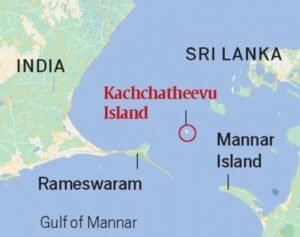
Why Katchatheevu issue in news?
In the midst of political campaigns in Tamil Nadu, the BJP has revived discussions around the longstanding Katchatheevu issue, accusing the Indira Gandhi government of conceding the island to Sri Lanka in 1974.
What is Katchatheevu Island?
- Katchatheevu is a small island, approximately 285 acres in size, situated within Sri Lanka’s maritime boundary, about 33 km off the coast of Tamil Nadu.
- Despite its modest dimensions, the island holds significant historical and religious significance, with the 120-year-old St.
- Anthony’s Church attracting pilgrims from both India and Sri Lanka for an annual festival.
- Its strategic location near the Palk Strait has also made it a focal point of contention between the two nations.
The 1974 Agreement:
- The Katchatheevu issue came to the forefront in 1974 when India and Sri Lanka signed an agreement, under which India purportedly ceded the island to Sri Lanka.
- However, Indian fishermen were granted access to Katchatheevu for specific purposes, including rest, net drying, and attending religious festivals.
- The agreement’s terms were subject to scrutiny and criticism, particularly regarding the fishing rights of Indian fishermen, which were not explicitly addressed.
The 1976 Development
- Two years later, in 1976, further negotiations between India and Sri Lanka led to the delineation of maritime boundaries and the establishment of sovereign rights over the Wadge Bank area near Kanyakumari for India.
- This strategic maritime patch, rich in marine resources, was deemed significant for both fishing activities and broader strategic interests.
- The agreement aimed to address the concerns raised by the 1974 agreement while securing India’s maritime interests in the region.
Aftermath and Ongoing Disputes:
- Following the agreements, disputes and demands for the retrieval of Katchatheevu persisted, especially as incidents of Indian fishermen being arrested in Sri Lankan waters escalated.
- Political leaders in Tamil Nadu, including J Jayalalithaa, sought to challenge the agreements, asserting that they infringed upon traditional fishing rights and livelihoods.
- However, legal proceedings and diplomatic efforts to address the issue have been met with challenges and complexities, reflecting the deep-rooted historical and geopolitical dynamics at play.
Legal Challenges and Current Status:
- Efforts to challenge the agreements culminated in legal proceedings, with petitions filed in the Supreme Court seeking the restoration of Katchatheevu to India.
- Despite ongoing debates and political rhetoric, no concrete steps have been taken by the Indian government to revisit the agreements or reclaim the island.
- The legal and diplomatic complexities surrounding the agreements continue to shape the discourse on this decades-old dispute, highlighting the need for nuanced approaches and diplomatic engagement to address the underlying grievances and concerns of all stakeholders.
Conclusion:
- The Katchatheevu dispute remains a contentious issue, reflecting the complex dynamics of territorial claims, maritime boundaries, and historical grievances between India and Sri Lanka.
- While political posturing and demands for resolution persist, the legal and diplomatic complexities surrounding the agreements continue to shape the discourse on this decades-old dispute, underscoring the importance of diplomatic engagement and dialogue in resolving longstanding disputes and fostering regional cooperation and stability.
People also ask
- What is the Katchatheevu issue?
- The Katchatheevu issue pertains to the disputed sovereignty of Katchatheevu, a small island located between India and Sri Lanka in the Palk Strait.
- What led to the Katchatheevu dispute?
- The dispute arose primarily due to conflicting territorial claims between India and Sri Lanka over Katchatheevu, compounded by historical, religious, and geopolitical factors.
- What agreements were made regarding Katchatheevu?
- In 1974, India and Sri Lanka signed an agreement under which India purportedly ceded Katchatheevu to Sri Lanka. However, Indian fishermen were granted certain rights to access the island for religious and fishing purposes. Subsequently, in 1976, further agreements were made regarding maritime boundaries and fishing rights in the region.
- What are the concerns of Indian fishermen regarding the Katchatheevu issue?
- Indian fishermen have expressed concerns about their traditional fishing rights being infringed upon following the agreements. They argue that the presence of Sri Lankan authorities in the region has led to increased restrictions and harassment, affecting their livelihoods.
Thanks for sharing. I read many of your blog posts, cool, your blog is very good.
I don’t think the title of your article matches the content lol. Just kidding, mainly because I had some doubts after reading the article. https://www.binance.com/zh-CN/register?ref=VDVEQ78S
I don’t think the title of your article matches the content lol. Just kidding, mainly because I had some doubts after reading the article.